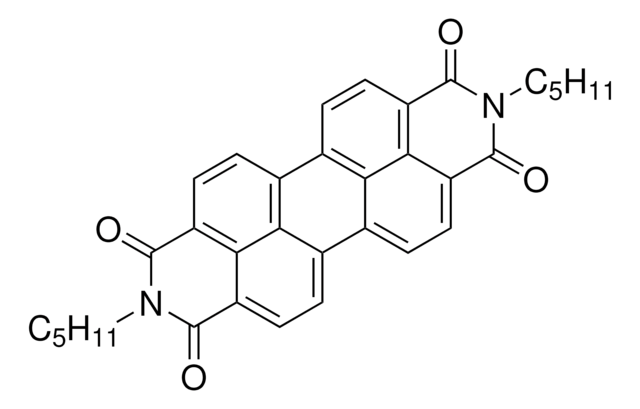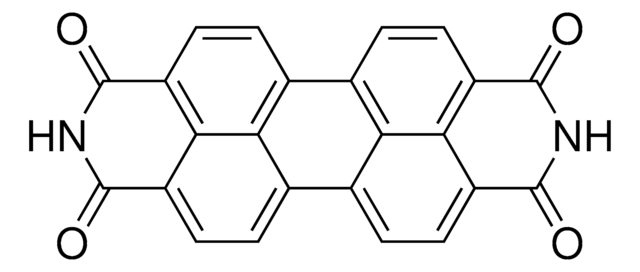663913
N,N′-Dioctyl-3,4,9,10-perylenedicarboximide
98%
Synonym(s):
PTCDI-C8
About This Item
Recommended Products
assay
98%
form
solid
mp
>300 °C
λmax
526 nm
fluorescence
λem ≤533 nm in chloroform
semiconductor properties
N-type (mobility=1.7 cm2/V·s)
SMILES string
CCCCCCCCN1C(=O)c2ccc3c4ccc5C(=O)N(CCCCCCCC)C(=O)c6ccc(c7ccc(C1=O)c2c37)c4c56
InChI
1S/C40H42N2O4/c1-3-5-7-9-11-13-23-41-37(43)29-19-15-25-27-17-21-31-36-32(40(46)42(39(31)45)24-14-12-10-8-6-4-2)22-18-28(34(27)36)26-16-20-30(38(41)44)35(29)33(25)26/h15-22H,3-14,23-24H2,1-2H3
InChI key
YFGMQDNQVFJKTR-UHFFFAOYSA-N
Application
signalword
Warning
hcodes
Hazard Classifications
Eye Irrit. 2 - Skin Irrit. 2 - STOT SE 3
target_organs
Respiratory system
Storage Class
11 - Combustible Solids
wgk_germany
WGK 3
flash_point_f
Not applicable
flash_point_c
Not applicable
ppe
dust mask type N95 (US), Eyeshields, Gloves
Certificates of Analysis (COA)
Search for Certificates of Analysis (COA) by entering the products Lot/Batch Number. Lot and Batch Numbers can be found on a product’s label following the words ‘Lot’ or ‘Batch’.
Already Own This Product?
Find documentation for the products that you have recently purchased in the Document Library.
Articles
Flexible electronic circuits, displays, and sensors based on organic active materials will enable future generations of electronics products that may eventually enter the mainstream electronics market.
Review the potential of self-assembled multilayer gate dielectric films fabricated from silane precursors for organic, inorganic, and transparent TFT and for TFT circuitry and OLED displays.
Small molecular weight organic semiconductors are promising for flexible transistor applications in next-gen soft electronics.
Intrinsically stretchable active layers for organic field-effect transistors (OFET) are discussed. Polymer structural modification & post-polymerization modifications are 2 methods to achieve this.
Our team of scientists has experience in all areas of research including Life Science, Material Science, Chemical Synthesis, Chromatography, Analytical and many others.
Contact Technical Service


![4,9-Dibromo-2,7-bis(2-octyldodecyl)benzo[lmn][3,8]phenanthroline-1,3,6,8(2H,7H)-tetrone](/deepweb/assets/sigmaaldrich/product/structures/100/693/87f6ccae-153b-4ba6-bd0a-653ba06ece22/640/87f6ccae-153b-4ba6-bd0a-653ba06ece22.png)

![N,N′-Bis[2-(2-tert-butyldimethylsilyloxyethoxy)ethyl]-3,4,9,10-perylenetetracarboxylic diimide 97%](/deepweb/assets/sigmaaldrich/product/structures/334/047/4ac691aa-ae25-4df1-9e0d-09ed12cb8f1f/640/4ac691aa-ae25-4df1-9e0d-09ed12cb8f1f.png)




